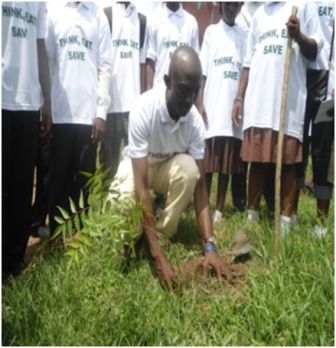Climate Change Fund: Nigeria Low Carbon Transport Options
Thank you climate change, thanks for being the factor for which Nigeria will be supported to move in direction of low carbon transport and energy efficiency. The British government listed Nigeria amongst developing nations that are beneficiaries of its International Climate Fund (ICF) this December.
Climate change is becoming a priority issue in Nigeria especially after a number of environmental anomalies in the past months ̶ both in the Northern & Southern parts of the country. Floods, erosion, drought and desertification are some these anomalies and more are predictedfor Nigeria.
Global warming is responsible for climate change and climate change is mainly caused by the action of human-induced Green House Gas (GHG) emissions that escape to the troposphere ̶ the lowest part of the earth’s atmosphere.
The main solution to global warming is to reduce emissions; major ways of doing this is to cut and cap them. Cutting emissions involves lessening emission output from systems and saving energy; capping emissions involves trapping emissions from the atmosphere by natural systems especially plants.
Low carbon transportation is one aspect of solution for global warming since emissions from vehicles contribute to more than 20% of the totalfor most countries. Low carbon transportation is broad and includes use & deployment of energy efficient vehicles.
Fuel efficient transportation is the new trend for manufacturers globally and most of them use this in campaigns for new products. 23m.p.g ̶ miles per gallon ̶ is the current trend and 35m.p.g is projected for around 2016 while 54m.p.g for 2030.
Nigeria as a developing economy may have issues in large scale deployment of current fuel efficiency standards especially for public transport; this therefore submits an option to somehow work around this with solutions that will save millions of tons of carbon in a given period.
Mass public transportation in Nigeria is not so much in a good shape as development issues fight efforts to restructure it. The whole system is also complicated by heavy traffic in major cities; this submits that both ‘internal and external’ factors should be considered for ‘low carbon public transport’.
From the knowledge of mechanical engineering, more weight is driven by more power, this shows that rush hour extra-loaded public transport vehicles emit more while conveying people. Most small carriers usually have four people sit on a thin locally-modified bench-like roll usually inconvenient and leave passengers wiggling against each other during their journey.
Prohibiting too many standees as the cause for overloaded large buses or mandating reduction of occupants on a roll in small buses are steps that will be very hard to effect round the country anytime soon. This again presents another hardline for ‘low carbon public transport’.
One of the effective ways to work on low carbon public transport in Nigeria is traffic reduction methods for major cities. Alternative transport means like rail and water ways diminutively used in some cities are helping road traffic situation but may hardly slash total traffic conundrum in the next 2 – 4years.
Traffic in some cities of Nigeria like Lagos, Port-Harcourt, Ota, and Onitsha can be simply solved using workable local procedures. Prioritizing road constructions and repairs of major routes or alternative routes will help; more training & enhancements for officials of traffic agencies in states will help too, use of simple traffic technologies and caution to unnecessary blocks by constabularies will drop-down total traffic intensively.
Since emissions from vehicles are part of the cause of global warming, an on-the-motion vehicle will contribute ‘lesser’ emissions to the environment for a given journey than if involved in protracted traffic. Traffic as a major issue in Nigeria requires all options for solution, a research draftsubmits some.
In steps towards emission reduction in Nigeria, fuel efficiency standard enforcement for vehicles coming into the country should be plannedfrom now to effect in future. This will drop emission amounts caused by ‘current under-regulation’ for fuel efficient engines for vehicles and power generators.
As early as the first half of 2012, low carbon public transport is possible in Nigeria ̶ but only ̶ at selected places. Most organizations in Nigeria like other parts of the world have complexes. Mass movement of officials or staff within these complexes is done by mini or semi-mini buses.
Maximum speed inside most of these complexes is between 20 – 30km/h; this is an advantage when fuel efficiency is considered for the environment. Since total distance covered is at a fairly constant speed, fuel consumptionis low and will be better if fuel efficient buses are used.
Encouraging through advertisement or with proposals to private and government owned organizations with a ‘large office area’ or complex to procure buses with fuel efficient standards to help them save finance and to save the environment will be a major ̶ short term ̶ step towards the low carbon transport objective.
Climate change finance has provided for Nigeria an opportunity to move in low carbon transport and energy efficiency direction. This finance is not enough for all the projects but coming as a propellant to see that Nigerian authorities understand the importance and finance it further. Most of the projects under the low carbon transport and energy efficiency direction will not only be good moves for climate change in Nigeria but is essential to improvingthe quality of lives in the country.
Britain may have specific projects to fund for Nigeria and Nigerian authorities will also present proposals for projects to Britain; consideration for proposals should include impact and sustainability so solutions will not be reversed ̶ for whatever reason ̶ after sometime. Submissions in this article present impactful and sustainable solutions; for the funds or Nigerian Government efforts, these should come.
Related Links:
Climate Change Mitigation and Adaptation in Nigeria Lagos Traffic Solution Low Carbon Africa: NigeriaBy David Stephen
Stay with Sierra Express Media, for your trusted place in news!
© 2011, https:. All rights reserved.





